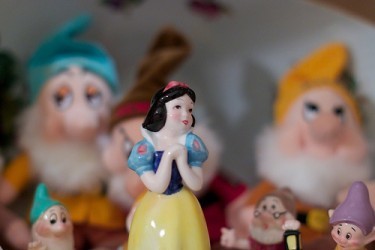 In an attempt to see as many movies as possible before my child is born, my wife and I went to see Snow White and the Huntsman. This basically served as an opportunity for me to see Thor again without dragging my wife to The Avengers for a second time. But the film itself had some interesting themes including the idea of conquering that which is seemingly insurmountable.
In an attempt to see as many movies as possible before my child is born, my wife and I went to see Snow White and the Huntsman. This basically served as an opportunity for me to see Thor again without dragging my wife to The Avengers for a second time. But the film itself had some interesting themes including the idea of conquering that which is seemingly insurmountable.
This week our Parsha, Shelach Lecha, discusses the story of twelve spies who Moses sends out to scout the Land of Canaan. The spies return with the “fruits” of their labor and ten of them relay their pessimistic outlook on the situation. These ten spies advise Moses and the Israelites not to enter the land of Canaan because the men of the land were giants and the Israelites would lose in battle. Caleb and Joshua oppose the other ten spies.
The obvious question that many readers and certainly our commentators ask is; how could these spies believe in the possibility of an Israelite failure after seeing how God helped them exile Egypt?
Rabbi Moshe Feinstein believes that it was all psychological. The Jews raised in the land of Egypt were accustomed to “seeing” God, either through idols or miracles. There was never a proactive recognition on the Israelites behalf. The Israelites now were in uncharted waters.
In the story of Snow White and the Huntsman, Snow White’s Kingdom is battered and taken over by the Wicked Queen. As the surviving locals take up the occasional ransack or small scale fight, they never have the courage to take back their kingdom. Until the kingdom witnesses a sign (via a cliché late movie heroic monologue) in the reemergence of Snow White.
 The idea that only a symbol or earth-shattering occurrence can prove God’s existence is a common feeling in the 21st century.
The idea that only a symbol or earth-shattering occurrence can prove God’s existence is a common feeling in the 21st century.
Many of us struggle with the realistic idea of miracles or the existence of God, because “seeing is believing.” Like the Israelites and Snow White’s kingdom we await something monumental to happen before we get the courage to attend synagogue or become an active member of the Jewish community, let alone wholeheartedly believe in God.
But the lessons of these two stories are really that the signs we need are all around us. The signs we need to believe in God and Judaism are in our history, traditions, rituals, and community.
Rabbi Elliot Dorff writes, “Caleb and Joshua saw the same land that the other ten spies had seen, but they reported that the Israelites could conquer it, despite its challenges. Sometimes that kind of positive self-perception and that kind of faith in oneself and in God are all that are needed to accomplish more than we ever thought we could.”
Let us be the Calebs and Joshuas (and even Snow Whites) in the world and have the bravery to stand up for God and against the reservations we might have with what lays ahead.
Pop – Snow White and the Huntsman: B+
Parsha – Shelach: B
(Photo: cogdogblog)


